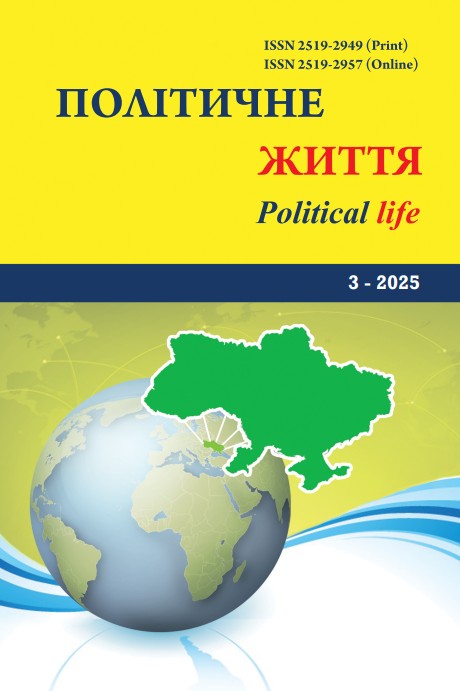Громадянське суспільство і демократія: уроки Польщі та перспективи для України
DOI:
https://doi.org/10.31558/2519-2949.2025.3.7Ключові слова:
громадянське суспільство; демократія; Польща; Україна; європейська інтеграція; інституціалізація; мобілізація; політична культураАнотація
Стаття присвячена аналізу особливостей розвитку громадянського суспільства в Польщі та Україні в контексті демократичних трансформацій. Застосовано порівняльно-історичний та інституційний підхід, що дозволив виявити сутнісні відмінності моделей становлення громадянського суспільства у двох країнах. З’ясовано, що у Польщі громадянське суспільство розвивалося еволюційно: починаючи від масового руху «Солідарність» та впливу Католицької церкви у 1980-х роках, воно з часом інституціалізувалося й стало важливим елементом демократичної системи. Завдяки участі в європейських програмах та тісній співпраці з державними структурами польські неурядові організації перетворилися на ефективний механізм реалізації демократичних стандартів та забезпечення інтеграції країни до Європейського Союзу. Акцентується, що В Україні розвиток громадянського суспільства відбувався переважно кризовим шляхом. Ключові етапи – Помаранчева революція 2004 р., Революція гідності 2013–2014 рр. та хвиля волонтерських ініціатив після початку російської агресії у 2014 і особливо у 2022 рр. Українське громадянське суспільство виявило потужну мобілізаційну здатність, здатність до самоорганізації та солідарності, проте його слабкими сторонами залишаються фрагментованість, нестача ресурсів та надмірна залежність від зовнішніх донорів. Порівняльний аналіз дозволив виокремити дві моделі демократизації: польську – еволюційну, засновану на інституціалізації та співпраці з державою, та українську – реактивну, що активізується під час кризових моментів. Для України корисними можуть бути уроки польського досвіду: перехід від ситуативної мобілізації до інституційної стабільності, посилення партнерства між владою та громадськими організаціями, а також розвиток громадянської освіти й політичної культури. Підсумовується, що, українське громадянське суспільство має значний демократизаційний потенціал, однак для його реалізації необхідно посилити інституційну базу та інтегрувати громадські ініціативи у процес європейської інтеграції.
Посилання
Hegel, G. W. F. (1991). Elements of the philosophy of right (A. W. Wood, Ed., H. B. Nisbet, Trans.). Cambridge: Cambridge University Press. 574 p.
Tocqueville, A. de. (2000). Democracy in America (H. Mansfield & D. Winthrop, Trans.). Chicago: University of Chicago Press. 722 p.
Політологічний енциклопедичний словник / Упорядник В. П. Горбатенко; За ред.. Ю. С. Шемчученка, В. Д. Бабкіна, В. П. Горбатенка. 2-ге вид., доп. і пеперероб. Київ: Генеза. 736 с.
Habermas, J. (1989). The structural transformation of the public sphere: An inquiry into a category of bourgeois society (T. Burger with F. Lawrence, Trans.). Cambridge, MA: MIT Press. 328 p.
Putnam, R. D. (1993). Making democracy work: Civic traditions in modern Italy. Princeton, NJ: Princeton University Press. 258 p.
Diamond, L. (1999). Developing democracy: Toward consolidation. Baltimore: Johns Hopkins University Press. 366 p.
Howard, M. M. (2003). The weakness of civil society in post-communist Europe. Cambridge: Cambridge University Press. 224 p.
Ekiert, G., & Kubik, J. (2014). Democracy in Central and Eastern Europe: Consolidation or backsliding? Cambridge: Cambridge University Press. 370 p.
Ash, T. G. (2002). The Polish revolution: Solidarity (3rd ed.). New Haven, CT: Yale University Press. 472 p.
Foa, R., & Ekiert, G. (2017). The weakness of post-communist civil society. Journal of Democracy, 18(1), 21–35.
Kravchuk, R. (2002). Politics and society in Ukraine. New York: Routledge. 256 p.
Горбатенко, В. П. Українське суспільство і державність у період трансформацій. Київ: Либідь. 2015. 304 с.
Павлюк, С. П. Революція гідності як феномен громадянського суспільства в Україні. Сучасність, 2014. №3, с. 21–30.
Карась, А. Громадянське суспільство в Україні: інституційні умови та перспективи розвитку. Філософська думка, 2017. №1. С.45–58.
Яблонський, В. М. (ред.). Громадянське суспільство в Україні: сучасний стан та перспективи розвитку. Київ: НІСД. 2017. 256 с.
Рябчук, М. Дві України: реальні межі, віртуальні війни. Київ: Критика. 2015. 240 с.
Onuch, O. Volunteers and civil society in Ukraine: Building democracy from below. Europe-Asia Studies, 2017. № 69(9). С. 1344–1369.

